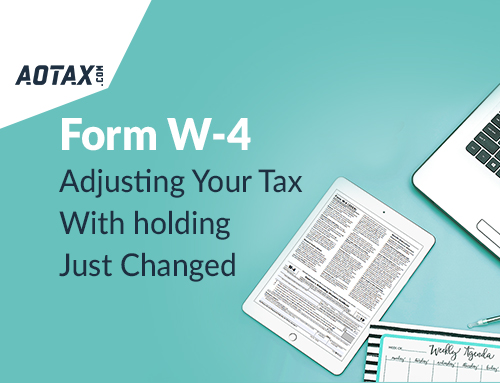
New W-4: Adjusting Your Tax Withholding Just Changed
New W-4: Adjusting Your Tax Withholding Just Changed
The IRS has recently introduced a new Form W-4. Due to this new Form, adjusting your withheld taxes from your paycheck would take a bit longer than usual. The only group that will not be affected by this form is taxpayers who are married and filing jointly.
Form W-4‘s format is long and essentially gets rids of a few allowances that the IRS earlier allowed for you and your family members. The form now asks for even more accurate information, which might even force you to take a look at the previous year’s tax return. It is in line with the Tax Laws that President Trump brought into effect in 2018.
As a taxpayer, it is essential that you get your withheld taxes correct. If you withhold a bit too much, you will impact liquidity or the salary that you take home. And if it is a bit too less, you will owe taxes to the IRS by the end of the year.
Who Needs The W-4?

The new form does not apply to workers unless there is a change in their tax status form the previous year. If your tax status remains the samefrom the last year, you don’t have to file the new W-4 Form. However, new employees and the ones who have had experienced a major life event such as getting married or giving birth to a child must file Form W-4.
The form is also applicable for taxpayers who aren’t too happy about their 2019 taxes. Whether you owe taxes of Uncle Sam or got smaller than expected refund, you must file W-4. Though it might seem a bit complicated, it actually simplifies the process that existed earlier.
Benefits For Married Couples
Married couples are one of the demographics, that benefit the most from the newly introduced form. As long as both the individuals follow some instructions, the new Form is relatively easier for married couples.Married couples now merely must check a box in the returns. This box indicates that both of them are working and the amount of withheld taxes will be calculated based on that. This process is way simpler than the earlier one, where one had to follow a lengthy worksheet with nine steps to determine how much taxes should a couple withhold from their paychecks.
Though this process is simpler, there is a catch in Steps 3 and 4. Should a couple select the working box, the higher earning spouse must fill out Steps 3 and 4. These ask the taxpayers details about dependents, deductions, any additional withholdings and an additional source of income.The previous step is essential in more than a few ways. Since it plays a crucial role in deciding the taxes that are withheld. If both individually fill additional income Step 4, the amount of taxes withheld from the paychecks will be considerably higher. Similarly, a couple decides to fill in details for dependents or deductions individually, the taxes withheld will be lower. Though it might sound attractive at first, you might end up with a hefty tax bill at the end of the tax season.

Ensure No Surprises

Since it is a new Form, filing it up diligently will ensure that you don’t have to encounter any surprises. One of the easiest ways is to keep the details of the previous year handy. Details such as other sources of income, deductions that you had claimed and tax credits that you received for dependents.
Spending a few minutes to understand and fill the form will ensure that you are neither overdoing or underdoing your withheld taxes.




Recent Comments